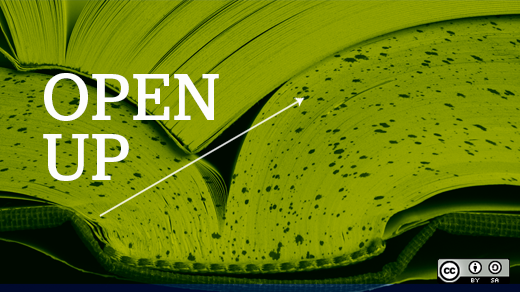The Rochester Institute of Technology Gollisano College Dean's Lecture Series established in 2003 was "designed to expose 'real world' experts to our students and to provide professional development opportunities for our alumni and community friends." Last year brought Walter Bender of Sugar Labs to speak with the crowd about another world-class FOSS campaign brought to us by the MIT Media Lab.
This year, Abelson gave the audience an update on all things OER, (open educational resources) and the new Center for Mobile Learning at MIT. We don't know much about about the brand-new CML (other than it has three component projects thusfar: AppInventor, Scratch, and The Education Arcade), so let's talk about OER.
Abelson's presentation took us on a journey throughout the history of the MIT OpenCourseWare and DuraSpace projects. He then spoke about the future of the academe, in the context of open content, (university) policy, legal infrastructure, and programming platforms. MIT OpenCourseWare celebrated it's tenth anniversary in May. It began in an era when industry was saying "there is a business economy for publishing lecture notes"--Hal and company said instead, "We're going to put our content on the internet, for free, for everyone, forever."
Hal shared with us a few metrics and statistics during his presentation:
MIT OpenCourseWare - as of last June
- Course metrics
- 2,711 courses
- 2,074 active, 637 archived
- Full video of 38 courses
- 987 courses translated to other languages
- 765 active, 222 retired
- 78% of MIT faculty are participating
- Usage/traffic metrics for June
- 1.4 million visits by 800,000 unique visitors
- 7.4 million page views
- 9,000 visits from MIT community
- 1.5 Million views/downloads from YouTube/iTunes
- 56% of traffic from outside of North America
Hal defined open education resources as "educational materials, put out under open licenses, so people can share, remix, and reuse them." The vision of OpenCourseWare is "universal access to the course content of the world's greatest learning institutions" and was one of two visions that were mentioned. The other vision, the one for DuraSpace, was described as "universal access to the collective intellectual resources of the world's greatest research institutions." If you really want to make a contribution, according to Hal, it is not enough to merely share your papers and conclusions; he invites researchers world wide to actually share their data .
But this is "last decade," according to Hal. This is a world of the Internet circa 2000. OpenCourseWare has grown up into OER, and DSpace has grown up into institutional repositories. The issues now are different, due to evolving sophistication. The next level of OER is related to the low-cost infrastructure for sharing this open content and collaboratively creating content.
Enter Khan Academy, described by Abelson as "the biggest phenomenon in education today." Educators have known for years that hour-long lectures are the wrong format, and the six-minute lectures on the Khan Academy websites are gaining a serious following. "Why pick up a textbook on balancing chemical equations when you can watch a six-minute video?" quipped Hal, particularly when the videos are followed immediately by exercises, interspersed with immediate feedback. "Not only will the best lectures be on the Internet, but also the best homework too!" Hal explained as he pointed the audience at the crowdsourced exercises served up on newly minted epicenter of the open code forges, GitHub.com.
Last July, Sebastian Thrun, of Google's Driverless Car and Research Professor at Stanford University, announced "a bold experiment in distributed education." Eighty people at the conference who heard the announcement firsthand said they would be interested. Now there are more than 135,000 people, who are signed up to take the Stanford AI course starting October 3. Not only is this research awesome, and the content open, it also helps illustrate Hal's point about low-cost infrastructure and scalability. "Any faculty can say 'I'm going to put my lectures on the Internet,' and if 30,000 people show up, they [the professors] won't notice the difference because of infrastructure."
"So why would an .edu support OER and institutional repositories" asked Hal? Here are two reasons:
- Without initiatives like these, traditional academic values will be increasingly marginalized, and university communities will become increasingly stressed.
- To keep a seat at the table in decisions about the disposition of eduction in the information age.
To support these reasons, Abelson gave a few specific fun facts, and suggested further reading on the topic:
- Further reading
- Fun facts
- MIT's academic journal expenditures have risen more than 350% in the last decade
- STEM journal publishers have gone from eight major players in 1998 to just four in 2011
"Don't tell me this increase is due to the rising price of ink," joked Abelson. "Fees are so large due in part to pay for the fees of corporate acquisition. As faculty, we're the producers. We're letting them get away with it." Abelson's key observation:
"The system of Journal Publication is structured as copyright negotiation between publishers and individual faculty authors. To prompt a move back toward balance, the faculty must play a role as a collective body, not only as individuals. Faculty and University have COLLECTIVE interests."
In Zittrain's book, he illuminates the concept of "Generativity"--the idea that things are made in such a way as to be extended in ways the original designers could not anticipate (e.g. the personal computer, and The Internet.) As we move toward architectures that are at risk of losing their generativity (try running your own code on your mobile device for instance), we may be losing a piece of the soul of innovation.
"If I had an iPad, rather than a real computer as a kid, I'd never be a programmer today."
--Alex Payne, Jan. 2010
Abelson follows this quote, with one from Clive Thompson of Wired.com:
Abelson summarized, "There really really really is a struggle going on for the future of academia. Universities have core institutional reasons to support oppenness. You really really can do this. There is infrastructure, and the will to do this. The challenge is our culture, and our university policies"
QUESTION & ANSWER:
Q1:
"I'm the person who is responsible for the library collection of this college. I want to thank you for doing me a favor and showing the graphic of the cost structure. I'm starting to hear tales from colleagues, who are seeing database vendors and publishers directly appealing to faculty. It is incomplete and disingenuous to blame just the .edu administrators. It is also tied up in this that we no longer, now that things are digital, choose what we subscribe to and what we don't. We purchase bundles. We devote large pools of resources to purchasing these bundles. When it comes to a point where we need to cut (budget), the decisions become extremely difficult if you cut a large package subscription v.s. specific journals."
A1:
"This discussion must happen here. The deans see it when the library makes outrageous demands. In the digital world, the library doesn't buy journals; it rents them. If you decide you're going to cancel, you not only lose the current issues, but the back issues as well. This is a system we are walking into, and willingly, through our tenure policies. There is no easy solution, but we need to know what is going on."
Q2:
"When you're up against an industry, you need allies. Who are they?"
A2:
"IP law is complicated. Congress are not experts. If you look at US copyright law (about 300 pages), there is probably not a line in there that is written by Congress. The way we make law is, the players get together about what to bring to the table, and Congress supports it (or doesn't). When are .edu's going to say "hey, we have something to bring to the table. You need to listen to us. Universities by and large are not doing this, but it will only happen if we care."
Q3:
"Why would professional societies (IEEE, ACM, American Chemical Society) line up behind publishers?"
A3:
"The American Chemical Society believes it is the proper steward of all chemical research. IEEE is not quite the same, but like many, has gotten hooked on its journal fees to support the organization. I know people at IEEE saying 'you are disembowelling us by removing our source of profit!' I say 'are you are membership organization, or are you propped up on your archives?' Even the organizations we respect and love, get hooked on their fees, it's not just the 'evil' publishers."
Q4:
"Can you talk about the role of teachers?"
A4:
"Deeply inspire students, partly by the way they teach, behave, and consult with people. I don't think digital changes that much--there was tremendous consternation in K-12 when people introduced blackboards. 'Where is the role of the teacher? What does lecture mean?' The university was where you heard Fourier read his notes in math. Those notes are now published. I wouldn't want to replace the .edu by watching stuff on TV. The role of faculty is to make more effective use of tools."
Q5:
"My salary was paid by the state, and I thought I should make my stuff available. If I work for a company, they own my IP. It is not fair for RIT students to fund RIT, and the professors' developments are available to everybody. Austria doesn't have spots for students to study. The students are not paying the state for making education materials available. Where is the business model?"
A5:
"There are two kinds of answers. Let me get rid of the radical answer--we agree it's better for society for knowledge to be open. Edu's must think about what the value is. If the value is the course notes and the exams. You can say that, but that isn't going to stop Khan. We all have to figure out what is the actual value we provide to students. The answer is inspiring students individually. We are not sources of notes, we are people, and it matters how we act. Getting there isn't going to be easy, and we live in interesting times."







5 Comments